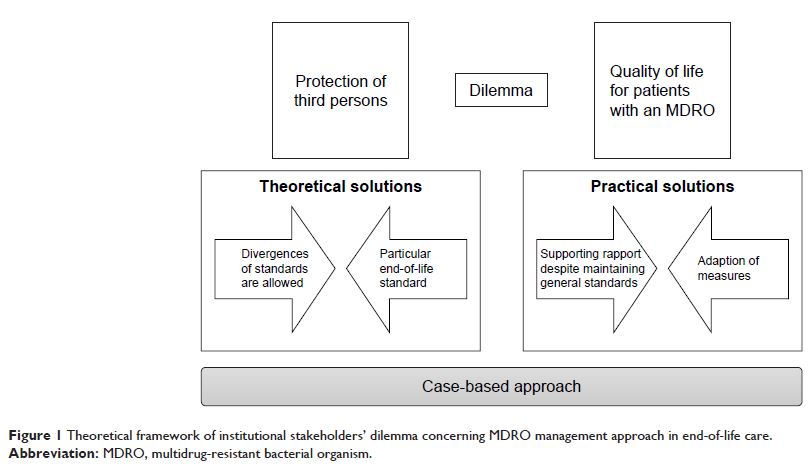108985
论文已发表
注册即可获取德孚的最新动态
IF 收录期刊
- 3.4 Breast Cancer (Dove Med Press)
- 3.2 Clin Epidemiol
- 2.6 Cancer Manag Res
- 2.9 Infect Drug Resist
- 3.7 Clin Interv Aging
- 5.1 Drug Des Dev Ther
- 3.1 Int J Chronic Obstr
- 6.6 Int J Nanomed
- 2.6 Int J Women's Health
- 2.9 Neuropsych Dis Treat
- 2.8 OncoTargets Ther
- 2.0 Patient Prefer Adher
- 2.2 Ther Clin Risk Manag
- 2.5 J Pain Res
- 3.0 Diabet Metab Synd Ob
- 3.2 Psychol Res Behav Ma
- 3.4 Nat Sci Sleep
- 1.8 Pharmgenomics Pers Med
- 2.0 Risk Manag Healthc Policy
- 4.1 J Inflamm Res
- 2.0 Int J Gen Med
- 3.4 J Hepatocell Carcinoma
- 3.0 J Asthma Allergy
- 2.2 Clin Cosmet Investig Dermatol
- 2.4 J Multidiscip Healthc

Understanding institutional stakeholders’ perspectives on multidrug-resistant bacterial organism at the end of life: a qualitative study
Authors Heckel M, Herbst FA, Adelhardt T, Tiedtke JM, Sturm A, Stiel S, Ostgathe C
Received 30 March 2017
Accepted for publication 15 July 2017
Published 3 October 2017 Volume 2017:12 Pages 1605—1613
DOI https://doi.org/10.2147/CIA.S138429
Checked for plagiarism Yes
Review by Single-blind
Peer reviewers approved by Dr Akshita Wason
Peer reviewer comments 2
Editor who approved publication: Dr Richard Walker
Background: Information lacks about institutional stakeholders’ perspectives
on management approaches of multidrug-resistant bacterial organism in
end-of-life situations. The term “institutional stakeholder” includes persons
in leading positions with responsibility in hospitals’ multidrug-resistant
bacterial organism management. They have great influence on how strategies on
multidrug-resistant bacterial organism management approaches in institutions of
the public health system are designed. This study targeted institutional
stakeholders’ individual perspectives on multidrug-resistant bacterial organism
colonization or infection and isolation measures at the end of life.
Methods: Between March and December 2014, institutional
stakeholders of two study centers, a German palliative care unit and a
geriatric ward, were queried in semistructured interviews. Interviews were
audiotaped, transcribed verbatim, and analyzed qualitatively with the aid of
the software MAXQDA for qualitative data analysis using principles of Grounded
Theory. In addition, two external stakeholders were interviewed to enrich
data.
Results: Key issues addressed by institutional
stakeholders (N=18) were the relevance of multidrug-resistant bacterial organism
in palliative and geriatric care, contradictions between hygiene principles and
patients’ and family caregivers’ needs and divergence from standards, frame
conditions, and reflections on standardization of multidrug-resistant bacterial
organism end-of-life care procedures. Results show that institutional
stakeholders face a dilemma between their responsibility in protecting third
persons and ensuring patients’ quality of life. Until further empirical
evidence establishes a clear multidrug-resistant bacterial organism management
approach in end-of-life care, stakeholders suggest a case-based approach.
Conclusion: The institutional stakeholders’ perspectives
and their suggestion of a case-based approach advance the development process
of a patient-, family-, staff-, and institutional-centered approach of how to
deal with multidrug-resistant bacterial organism-positive patients in
end-of-life care. Institutional stakeholders play an important role in the
implementation of recommendations following this approach.
Keywords: hygiene
measures, hygiene procedures, management approach, geriatric care, palliative
care, end-of-life care, terminal illness, comorbidity
